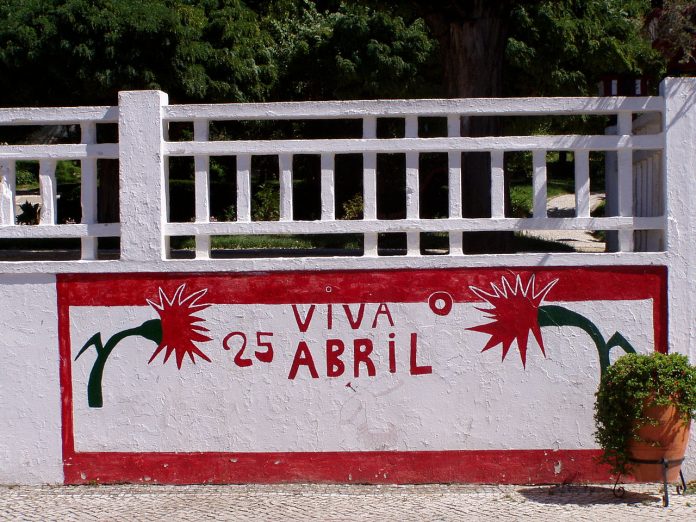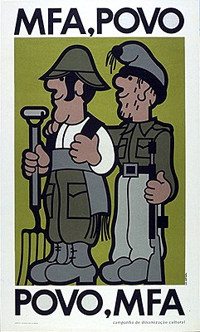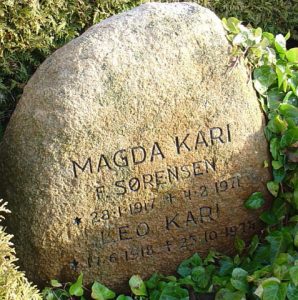
Socialistisk Biblioteks Tidslinje med links til begivenheder og personer i 1974.
Se også Index over personer, organisationer/partier og værker (som bøger, malerier, mm.), steder, begivenheder, mv., der er omtalt på hele Tidslinjen, titler og indhold på emnelisterne osv.
25. april
Nellikerevolutionen i Portugal udløser revolutionære tilstande i landet (til november 1975).
Leksika:
- Nellikerevolutionen (Denstoredanske)
- Carnation Revolution (Wikipedia.org)
Skandinaviske artikler:
25. april – da en socialistisk revolution væltede Portugals fascistiske regime. Af Lasse Olsen (Solidaritet.dk, 30. april 2024). “25. april 1974 blev Portugals fascistiske diktatur væltet ved Nellikerevolutionen – Europas seneste vellykkede socialistiske revolution. Solidaritet bringer her en reportage fra fejringen af 50-året for Nellikerevolutionen.”
50 år siden: Portugals Nellikerevolution rystede Europas magthavere. Af Alfred Lang (Autonom Infoservice, 24. april 2024). “Da en gruppe venstreorienterede officerer, der var præget af krigen mod befrielsesbevægelserne i Angola, Mozambique og Guinea Bissau, i foråret 1974 gjorde oprør, tændte de en lunte, der blev til en vulkan i udbrud.” Artiklen er skrevet i 2011 og løbende ajourført.
Otelo de Carvalho er død. Af Niels Frølich (Solidaritet.dk/Kritisk Revy, 15. august 2021). “Strategen bag nellikerevolutionen i Portugal 25. april 1974, Otelo Saraívo de Carvalho, døde søndag d. 25. juli. Dermed forsvandt en af de mest farverige skikkelser på den europæiske venstrefløj.”
Portugals nellikerevolution: Frihed frem for alt! Af Peter Robinson (Solidaritet.dk, 15. maj 2020). “Den revolution, der fandt sted i Portugal fra 1974-75, er det bedste og mest inspirerende eksempel på en revolutionær proces, man har oplevet i Europa siden Anden Verdenskrig … Derfor er Raquel Varelas bog A People’s History of the Portuguese Revolution vigtig.” Se engelske anmeldelser nedenfor.
Plakater fra Nellikerevolutionen i Portugal 1974-76 (pdf). Af Olaf Harsløf (Arbejderhistorie, nr.2, 2018, s.99-113). “Med sig hjem havde de både farvestrålende og udtryksfulde valg- og teaterplakater, og klingende grammofonplader med nellikerevolutionens sange og musik.”
Nellikerne der ikke sprang ud. Af Jørgen Lund (Socialistisk Arbejderavis, nr.15, december 1985, s.6). “For 10 år siden blev de forhåbninger og forventninger, som den såkaldte »nellike-revolution« i Portugal rejste, knust.”
Portugal: Læren af den 25. november (1975). Af Tony Cliff og Chris Harman (Marxisme Online). “Den forsøger at uddrage noget af læren af venstrefløjens manglende evne til at forhindre højrefløjens sejr. Endvidere forsøger den at anvise nogle metoder, som kan rette op på svaghederne før den næste store konfrontation.”
Portugal ved korsvejen (uddrag) (1975). Af Tony Cliff (Marxisme Online). “… er skrevet, mens den portugisiske revolution bevæger sig ind i den krise, der få måneder senere skulle ende med at stabilisere den herskende klasses greb om landet.”
Portugal – reform eller revolution: en analys av utvecklingen första året efter kuppen 25 april 1974 till Vasco Goncalves fall den 30 august 1975 (pdf). Av Svengöran Dahl och Göran Wiklander (Socinform, 1975, 263 sider; online på Marxistarkiv.se)
Temaer på Marxistarkiv.se:
Tidskriften Fjärde Internationalen om Portugal (pdf) (1974-1976, 46 sider)
Tidskriften Kommunist om Portugal (pdf) (1976, 59 sider)
Tidskriften Zenit om omvälvningarna i Portugal (pdf) (1975-1976, 46 sider)
Litteratur på dansk:
- Portugal: militærbevægelse og klassekamp. Af Arno Münster. Efterskrift af Ralf Pittelkow (side 145-275) (Politisk Revy, 1975, 275 sider)
- Portugal: på vej mod socialismen? Redigeret af KF’s Portugalgruppe i Århus (Modtryk, 1975, 347 sider)
- Nellikerevolutionen – Portugal 1974-75. Af Peter Robinson (Internationale Socialisters Forlag, 1988, 46 sider; online på Marxisme Online) (Revolutioner i vores tid, 3)
In English:
Socialist alternatives: The Portuguese Revolution (Marxist Left Review, Issue 27, Autumn 2024). “Joel Geier revisits the inspiring revolution that took place in Portugal 50 years ago, toppling a fascist regime, but ultimately missing an opportunity to progress to workers’ power and socialism. His eye-witness account provides valuable insights into the strengths and weaknesses of the revolutionary movement.”
Lessons from the Portuguese Revolution. By Héctor Sierra and Eva Sousa Colwell (International Socialism, Issue 183, Summer 2024). “The Portuguese Revolution represents the climax of the revolutionary period inaugurated by the May 1968 uprising in Paris. For those struggling against capitalism today, there is much to learn from this episode. Yet, the defeat of the revolution and the rise of the far right today also raise a vital question: why was the emancipatory potential of the revolution unfulfilled?”
The Carnation Revolution remembered. By Tom Harrison (Solidarity & Workers Liberty, Issue 708, 7 May 2024). About Alex Fernandes, The Carnation Revolution: The Day Portugal’s Dictatorship Fell (Simon & Schuster, 2024, 400 p.). “Alex Fernandes gives us an impressive account of the most significant revolution in Western Europe since 1945 … It is the one of the few books in English I’m aware of that deal with that important historical event in detail.”
Remembering the Portuguese Revolution (RS21, 25 April 2024). “On the 50th anniversary of the Revolution, Raquel Varela, author of A People’s History of the Portuguese Revolution, speaks to rs21 about what happened next.”
Portugal’s revolution transformed the politics of Europe (Jacobin, April 25, 2024). Daniel Finn interviews Raquel Varela: “Fifty years ago today, Portugal’s Carnation Revolution began as soldiers overthrew the dictatorship. Although the revolution was ultimately contained, it changed the face of European politics and hastened the shift to democracy in Spain and Greece.”
Lessons of the Portuguese revolution of 1974. By Rui Faustino (In Defence of Marxism, 25 April 2024). “Fifty years ago today, the Portuguese Revolution began when a section of the military moved against the dictatorship, unleashing a powerful workers’ movement. This article draws out the lessons from this inspiring, but also tragic episode in history.”
Remembering the Carnation revolution. By Brais Fernandez and Dave Kellaway (International Viewpoint, Issue 591, 24 April 2024). “This week sees the 50th anniversary of the Portuguese ‘Carnation’ Revolution that erupted in 1974 and was finally tamed in 1976 with the election of a government led by Soares from the Socialist Party(SP). The moderate SP consolidated many reforms won in the previous two years but also restored the capitalist order.”
Portugal ’74—When workers and soldiers fought for real power (Socialist Worker, Issue 2901, 21 April 2024). “Half a century ago this month millions took part in a revolution that brought down a brutal dictatorship and opened the possibility of fundamental socialist change. Dáire Cumiskey looks at the revolution and talks to author and historian Raquel Varela.”
How colonial war led to revolution in Portugal. By Luke Ottavi (Solidarity, 11 April 2024). “The revolution in Portugal, beginning 50 years ago in 1974 with a revolt in the army, saw workers take control of hundreds of factories.”
Portugal’s forgotten revolution (Red Pepper, 29 February 2024). “The ‘carnation revolution’ saw soldiers, workers and communities join forces to overthrow fascism and challenge capitalist power. Peter Robinson traces events from April 1974.”
Portugal: the death of Otelo – defend the revolutionary legacy, bury the myth. By Colectivo Marxista (In Defence of Marxism, 26 August 2021). “As a young army major, Otelo planned and coordinated the military coup of 25 April 1974 against the Estado Novo dictatorship in Portugal, despite the fact that the army had previously been one of its main pillars of support.”
The Portuguese revolution and women’s liberation. By Rafaela Cortez (Jacobin, August 1, 2020). “After the overthrow of Portugal’s fascist regime in 1974, a radical movement arose to challenge the near-total lack of rights accorded to women. The violent breakup of the movement’s first protest showed how difficult their struggle would be — yet their activism helped bring about a lasting transformation.”
A People’s History of the Portuguese Revolution. By Bob Light (Socialist Review, Issue 444, March 2019; online at Internet Archive). Review of Raquel Varela’s book, edited by Peter Robinson (Pluto Press, 2019, 352 p.). “This is an important and long-overdue book which I recommend strongly.” See more reviews:
Orlando Hill: A People’s History of the Portugese Revolution (Counterfire, April 25, 2019) Peter Robinson: So much freedom! Portugal’s Carnation Revolution (International Socialism, Issue 163, Summer 2019, p.153-161)
Rex Dunn: Direct vs representative democracy (Weekly Worker, Issue 1266, 12 September 2019)
Brian Parkin: Portugal’s revolution portrayed (RS21, 6 December 2019)
+ interview with Raquel Varela: Today, we Celebrate the Carnation Revolution (Jacobin, April 25, 2019).
Fragmented power: Portugal in revolution, 1974-1975. By Doug Enaa Greene (Links: International Journal of Socialist Renewal, February 11, 2018). “Why did the Carnation Revolution fail? Despite its impressive demonstrations and energy, the revolutionary left remained weak. They were also divided between multiple groups with divergent and contradictory strategies.”

The PCP in the Portuguese Revolution 1974-5: crisis, state and revolution. By Raquel Varela (International Socialism, Issue 157, Winter 2018, p.129-139). ” I argue here that the revolution happened despite the party, not because of it.”
Portugal 1974-5: The Carnation Revolution (Workers’ Liberty, 3/46, 17 December 2014). Contents: Portugal: the Carnation Revolution of 1974-5 + When the far left lined up behind the military + Organs of “popular power”.
40 years since Portugal’s ‘Carnation Revolution’ (Socialist Worker, No.3400, 22 April 2014). “Sadie Robinson looks at a struggle that put workers’ power on the agenda.”
Portugal: The Carnation Revolution remembered (Red Pepper, April 2014). “Dick Barbor-Might looks back on a coup against a dictator that sparked a wider revolutionary upsurge.”
Portugal: 1974-5. By Bob Light (International Socialism, Issue 142, Spring 2014; online only). “It is arguably the closest we have come to real workers’ power since the Spanish Revolution in 1936.”
Forty years later: the grandeur and the limits of the Portuguese Revolution. By Ugo Palheta (International Viewpoint, No.471, April 2014). “The last example of a popular and radical uprising in western Europe, it brought down the oldest dictatorship on the continent …”
40 years after the Carnation Revolution. By Jorge Costa (International Viewpoint, No.471, April 2014). “… the experience … continues to be an absolutely fundamental lesson about the nature of the power of the bourgeoisie, and its ability to survive, adapt and restructure.”
Fifty years since Portugal’s Carnation Revolution (World Socialist Web Site, 24 April 2024). “This edited version of the three-part series on the Carnation Revolution, written by Paul Mitchell and originally published on July 15, 16 and 17, 2004.”
30 years since Portugal’s revolution. By David Hayes (Socialist Worker, No.1898, 24 April 2004; online at Internet Archive). “Eyewitness: ‘I went to factories under workers’ control’.”
Revolution in Portugal (Socialism Today, No.82, April 2004). “Manny Thain looks back at these tumultuous events, when the dictatorship collapsed.”
Portugal 1974-75: The forgotten dream (pdf). By Peter Robinson (Socialist History Society, 1999, 30 p.) (Socialist History Occasional Papers Series, 9). “From October 1975 until the following June I worked for the IS as a political organiser, based in Lisbon … It was an extraordinary period, one that still needs to be studied and celebrated.”
Social Democracy and the Portuguese ‘revolution’. By Ian Birchall (International Socialism, No.6, Autumn 1979, p.71–84). “A revolutionary movement that underestimates the power of reformism will pay a heavy price for it.”
Portugal: The Impossible Revolution. By Phil Mailer. With a foreword by Maurice Brinton (London, Solidarity, 1977, 400 p.; online at Libcom.org). “It is the story of what happened in Portugal 1974-1975 – as seen and felt by a deeply committed participant.”
Documents and articles on Portugal (pdf) (Socialist Workers Party (US)/Internal Information Bulletin, No.4, March 1976, 63 p.). With a critique of the British International Socialists.
Portugal: the latest phase. By Chris Harman (International Socialism, No.83, November 1975, p.6-9). “Portugal’s sixth government is already, at the time of writing, as impotent and isolated as the fifth government which preceded it.”
Special issue: Portugal at the crossroads. By Tony Cliff (International Socialism, No.81/82, September 1975, 48 p.). With Chronology of events.
Revolution and counter revolution in Portugal. By Nahuel Moreno (Supplement to the July-August 1975 issue of Revista de América, Buenos Aires; online at Marxists Internet Archive). See also response by Gus Horowitz: The differences over Portugal (May 2, 1976)
The views of a PRP Leader (International Socialism, No.80, July/August 1975, p.19-20). “… a shortened version of the contribution made by a leading member of the PRP (Revolutionary Party of the Proletariat) of Portugal.”
Communist Party of Portugal (PCP) (Marxists Internet Archive; Comintern Archive). Articles from PCP 1974.
Perspective for the Portuguese Revolution. By Albert Weisbord (La Parola del Popolo, May-June 1974; online at Marxists Internet Archive). “At last the long overdue Portuguese Revolution has started.”
Portugal: the first six months. By Chris Harman (International Socialism, No.72, October 1974, p.5-6). “The Portugese bourgeoisie has learnt over the last six months that it is one thing to get rid of a government that no longer accords with your needs. It is another to ensure the substitution of a stable alternative.”
Se også:
- Luso-Anomalies. By Daniel Finn (New Left Review, Issue 106, July-August 2017, p.5-32). “How and why has Portugal differed from Spain since the downfall of their respective dictatorships in the mid 70s?”
- Ubu saved from drowning: worker insurgency and statist containment in Portugal and Spain, 1974-1977. By Loren Goldner (Queequeg Publications, 2000, 113 p.; online at Libcom.org). “An analysis of the end of the Salazar and Franco regimes and the transition crises that marked ” the last major working class upsurges in the West in the era of the big factory.”
Se også:
- Tidslinjen 25. november 1975 om afslutningen af den revolutionære periode (Socialistisk Bibliotek).
9. maj 1974
Majstrejkerne i Danmark starter.
Se:
- Ud med Hartling/Fogh: fra 1974 til i dag. Af Hans Erik Madsen (Socialistisk Arbejderavis, nr.224, 4. februar 2004)
Litteratur: - Krisen, majstrejkerne og arbejdsløsheden: en samling artikler om klassekampens udvikling i Danmark: fra politisk revy november 1973 til november 1974 (Politisk Revy, 1974, 78 sider)
- Majstrejkerne 1974. Af Jan Storgaard (Socialistisk Arbejderavis, nr. 103, maj 1994)
Se også:
- Den københavnske arbejderopposition og venstregrupperne. Af Poul Petersen og Kim Thygesen (Proletar! nr. 9, august 1974, s.9-13; online på Marxisme Online)
24. maj 1974
Amerikanske jazzpianist Edward Kennedy Ellington – Duke – dør i New York (født 29.4.1899).
“Put it this way: Jazz is a good barometer of freedom; In its beginnings, the United States of America spawned certain ideals of freedom and independence through which, eventually, jazz was evolved, and the music is so free that man people say it is the only unhampered, unhindered expression of complete freedom yet produced in this country.” (‘It don’t mean a thing if it ain’t got that swing’).
Se:
- Duke Ellington (Wikipedia.org)
- Band of gold. By Martin Smith (Socialist Review, Issue 228, March 1999)
9. juni 1974
Digteren Miguel Asturias dør i Madrid (født 19.10.1899 i Guatemala City).
Nobels litteraturpris i 1967, Leninprisen i 1966.
Se:
- Miguel Angel Asturias (Leksikon.org).
- Miguel Angel Asturias – Bibliographical (Nobelprize.org)
- Miguel Angel Asturias (1899-1974) (Democracy & Socialism; incl. short video)
29. juni 1974
Den tyske forfatter Erich Kästner dør i München (født 23.2.1899).
Se:
- Erich Kästner (Wikipedia.de) med links til bl.a. (meget korte!) danske og til engelske artikel.
- Erich Kästner (Denstoredanske.dk)
23. juli 1974
Den græske militærjunta tvinges til at gå af.
8. august 1974
USAs præsident Nixon må trække sig fra embedet pga Watergade-skandalen. Afløses af vicepræcident Gerald Ford (1973–1974)
Se:
- Tidslinjen 17. juni 1972 (Socialistisk Bibliotek)
21. august 1974
Den amerikanske socialist og grundlægger af den trotskistiske bevægelse i USA, James P. Cannon dør i (født Rosedale, Kansas, 11. februar 1890, se denne)
24. august 1974
Første kvindefestival i Fælledparken i København – “Ingen kvindekamp uden klassekamp“.
24. oktober 1974

Den danske modstandsmand og frivillig i den spanske borgerkrig, Leo Kari, dør. (Født 11. juni 1918 i Rødovre. (Døde 24. oktober 1974 i København; begravet på Tømmerby Kirkegård ved Thy. “Håber det hjalp. Hilsen Rina”). Forfatter til første biografi om danske spaniensfrivillige: De danske spaniensfrivillige (Rosenkilde og Bagger, 1952, 206 sider).
Biografier:

- Leo William Kari (Nationalmuseet; Frihedsmuseets modstandsdatabase). Med oplysninger om modstandsaktivitet mv.
- Leo Kari (Biografi.dk; International forfatterbibliografi)
“Leo Kari: En dansker i spansk krigstjeneste 1937-1938”. Af Morten Rievers Heiberg, – i: Danskere i krig 1936-1948. Red. Rasmus Mariager (Gyldendal, 2009, side 11-51)
“Fra borgerkrig til dødsmarch: Laurits Holm Christensen, Johannes Abildgaard Jacobsen og Leo Kari. Tre skæbner fra kampen mod fascismen og nazismen” (pdf). Af Flemming Skipper, – i: Historisk årbog for Thy og Vester Hanherred (2010, side 61-80). Om Leo Kari, side 73-80.
‘Selv de Stalintro kunne ikke drømme om at forråde Danmark’. Af Morten Mikkelsen. (Kristeligt Dagblad, 22. juni 2016). “74-årige Lenni Kari voksede op som datter af kommunist, spaniensfrivillig og modstandsmand Leo Kari. Hun vurderer, at faderen mest var drevet af idealisme. Og konstaterer, at noget gjorde, at han og mange kammerater ikke kunne leve, til de blev 60 år.”
Litteratur:
Bag Spaniens bjerge: en erindringsroman. Af Leo Kari, redigeret af Lenni Kari (Modtryk, 1998, 286 sider). Se anmeldelse i Bogummet.dk.
Podcast:
En podcast af Rina Ronja Kari. Den 11. juni (2018) ville hendes oldefar, den kendte spaniensfrivillige og modstandsmand Leo Kari, være fyldt 100 år. Her fortæller Rina hans historie. (YouTube.com, 10:02 min.).
29. oktober 1974
Den danske kommunistiske veteran, fagforeningsmand og Komintern-agent Richard Jensen dør i Sundby. (født på Frederiksberg 24. februar 1894, se denne).
30. oktober 1974
Tidligere fremtrædende kommunist, Komintern-agent og formand for Søfyrbøderne, Richard Jensen, dør (født 1894).
Se:
- Richard Jensen (Leksikon.org)
2. november 1974
Dannerhuset i København besættes og omdannes til kvindekrisecenter.
13. november 1974
Karen Silkwood, amerikansk fagforeningsaktivist beskæftigede sig med sikkerheds- og arbejdsforhold på a-kraft-værk, da hun døde under mistænkelige omstændigheder i 1974.
Se:
- Karen Silkwood (Wikipedia.org)
- Silkwood (Wikipedia.org). Om 1983-filmen.
Whistleblower Karen Silkwood’s urgent message for us. By Sarah Milov and Katherine Turk (Jacobin, December 28, 2024). “Karen Silkwood died in 1974 while trying to expose dangerous conditions in her workplace. Her death — and the smear campaign that followed — highlights how retaliation against whistleblowers deflects scrutiny from power by targeting the messenger.”
Karen Silkwood remembered. By Sharyn Jenkins (Green Left Weekly, Issue 458, 1 August 2001). “Twenty-seven years ago, US anti-nuclear activist Karen Silkwood was killed in a car crash many suspect was deliberately caused by the Kerr McGee nuclear company.”
13. november 1974
I FNs generalforsamling i New York taler for første gang en indbudt taler, der ikke repræsenterede nogen stat, da Yassir Arafat, formand for PLO, holder den såkaldte olivengren-tale.
Se:
- Yasser Arafat’s 1974 UN General Assembly speech (Wikisource)
- Yasser Arafat speech at the UN (United Nations) in 1974 (YouTube.com, 10 min.)
Palæstinensisk uenighed om statsproklamation i FN (Autonom Infoservice, 14. september 2011)
Tags: International recognition of Palestinian state (The Electronic Intifada)
The question of Palestine in miniature. By the Editors (Middle East Report Online, September 16, 2011)
At the UN, the funeral of the two-state solution. By Ilan Pappe (The Electronic Intifada, 12 September 2011)
Se også:
Palæstina-Danmark, samme kamp, kap. 8, – i: Karen Steller Bjerregaard: ”Et undertrykt folk har altid ret” – Solidaritet med den 3. verden i 1960’ernes og 1970’ernes Danmark (pdfl) (Ph.d.-afhandling ved Institut for kultur og identitet, RUC 2010, 499 sider). Scroll ned til side 379-456.
Palestinian nationalism and the Arab revolution. By Phil Marshall (International Socialism, Issue 33, Autumn 1986, p.34-58; online at Marxists Internet Archive)
Se også på Socialistisk Bibliotek:
- Tidslinjen 24. august 1929 om Yassir Arafat
- Emneoversigten: Palæstina/Israel
21. november 1974
Bombeattentater på to pubber i Birmingham koster 20 liv. En gruppe irere på 6 bliver anholdt og fængslet indtil 1991 på grundlag af falske anklager.
Se:
- Birminham Six (Denstoredanske)
- Birmingham Six (Wikipedia.org)
Se også på Socialistisk Bibliotek:
- Tidslinjen 28. oktober 1989 om Guilford Four.
8. december 1974
Folkeafstemning i Grækenland afskaffer monarkiet, med 69 mod 31%.
Se:
- Greek Public referendum 1974 (Wikipedia.org)
17. december 1974
Teatergruppen Solvognen starter forestillingen “Julemandshæren”, der aktionerer frem til 23. december.
Se:
Linksamlingen Jul – andre sider af julen: Julemandshæren (Socialistisk Bibliotek)





























